|
|
|
Sort Order |
|
|
|
Items / Page
|
|
|
|
|
|
|
| Srl | Item |
| 1 |
ID:
103302
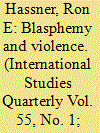

|
|
|
|
|
| Publication |
2011.
|
| Summary/Abstract |
Why did riots in response to the 2005 Danish cartoons depicting the Prophet Muhammad occur in nine Muslim states but not in 43 other states in which Muslims form a majority of the population? I show that the location of the cartoon riots is best explained by combining insights from the study of politics with arguments from the sociology of religion. Protests were mobilized by radical Islamist movements alarmed by the moral threat posed by the blasphemous cartoons. In states characterized by political rights and civil liberties, regimes responded haphazardly to the demonstrations, leading to confrontations between security forces and angry rioters. This finding can be generalized beyond the Muslim world: We should expect reactive religious violence wherever fundamentalist movements are confronted by transgressive acts, committed by threatening opponents, in a political environment that permits protest but fails to protect the religious principles of the movement.
|
|
|
|
|
|
|
|
|
|
|
|
|
|
|
|
| 2 |
ID:
103308
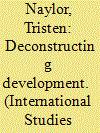

|
|
|
|
|
| Publication |
2011.
|
| Summary/Abstract |
This study examines how power operates within international development discourse and investigates its effects on development organizations and on individuals-donors and recipients of aid alike. It analyzes the narratives pertaining to Afghanistan that are (re)produced by five different types of development actors: a donor state, a recipient state, an international financial institution, an international organization, and a non-governmental organization. I argue that the operation of multiple, interrelated types of power has both ideational and material effects which manifest in development policies, programs, and projects. I demonstrate how these types of power operate discursively through a Politics of Pity which (re)creates and perpetuates hierarchical, coconstituted relationships between and among these actors, and which (re)constitutes the identities and abilities of actors.
|
|
|
|
|
|
|
|
|
|
|
|
|
|
|
|
| 3 |
ID:
103306


|
|
|
|
|
| Publication |
2011.
|
| Summary/Abstract |
Developing countries vary dramatically in the amount they spend on social insurance. We establish a theoretical framework linking autarkic post-World War II economic development strategies with the emergence of insurance-based social policies. We argue that a government's choice of development strategy is conditioned by the size of the domestic market, relative abundance of labor, and land inequality in the context of a closed international trading system. The development strategy in turn shapes the fiscal priority governments place on social insurance. Contrary to the compensation hypothesis prominent in studies of the rich democracies, protectionist countries emphasize social insurance. Empirical analysis finds support for our argument. The results suggest that economic policies in the 1950s, 1960s, and 1970s had important implications for the emergence and current contours of social policy in the developing world. These differences in priorities swamp recent within-country changes.
|
|
|
|
|
|
|
|
|
|
|
|
|
|
|
|
| 4 |
ID:
103318
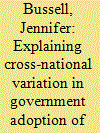

|
|
|
|
|
| Publication |
2011.
|
| Summary/Abstract |
New information and communication technologies provide governments with opportunities to deliver public services more effectively to their citizens. But we know little about the reasons for variation in the adoption of these technologies across countries. Using cross-national data on government use of information technologies to reform public service delivery, or eGovernment, I argue that politicians' expectations about the effects of more transparent service delivery on established patterns of rent-seeking play an important role in shaping variation in the character of reforms. I show that the level of preexisting corruption in a country is a robust predictor of eGovernment outcomes, with more corrupt governments less likely than their less corrupt peers to implement high-quality public service reforms using information technology. This finding contrasts with those analyses that emphasize the role of economic conditions or regime type in explaining technological diffusion.
|
|
|
|
|
|
|
|
|
|
|
|
|
|
|
|
| 5 |
ID:
103316
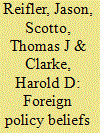

|
|
|
|
|
| Publication |
2011.
|
| Summary/Abstract |
This paper examines the structure and domestic political relevance of foreign policy beliefs in contemporary Britain. Confirmatory factor analyses (CFA) of data gathered in five national surveys conducted between May and September 2008 show that the British public's foreign policy beliefs are organized by two latent factors, which we label Liberal Internationalism and British Militarism. These factors closely resemble those reported in studies of the foreign policy beliefs of the American public. Analyses reveal significant covariation between the two foreign policy belief factors and voting intentions, as well as with partisanship and feelings about party leaders-key predictor variables in voting behavior models. These relationships remain significant in the presence of several controls, including measures of incumbent government performance in domestic and foreign policy domains. Demonstrating that foreign policy beliefs matter for the fates of political parties and their leaders helps to explain how public opinion in democratic politics affects the conduct of international relations.
|
|
|
|
|
|
|
|
|
|
|
|
|
|
|
|
| 6 |
ID:
103301
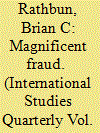

|
|
|
|
|
| Publication |
2011.
|
| Summary/Abstract |
This article seeks to overturn the conventional wisdom that World War II forced a decisive, bipartisan break in American grand strategy. As they had after World War I, American political elites debated the relative merits of unilateralism and multilateralism. Assessments of the relative costs and benefits of a cooperative and multilateral solution to American security depended on judgments about the likelihood of opportunism by America's partners. Democrats were more trusting than Republicans, expecting cooperation where the latter anticipated defection. This led to different preferences for the creation and design of the United Nations and the North Atlantic Treaty. Drawing on theories of "social orientation" and political ideology, I explain why the left is more trusting than the right. Rationalist accounts of the creation and design of the UN and NATO overstate the case for ideological convergence and therefore the importance of structure because they largely ignore behind-the-scene bipartisan consultations that allowed for a compromise prior to the votes on the respective treaties. My social psychological theory of international cooperation demonstrates that multilateralism is a dispositional trait, not a simple functional response to some objective security situation.
|
|
|
|
|
|
|
|
|
|
|
|
|
|
|
|
| 7 |
ID:
103304


|
|
|
|
|
| Publication |
2011.
|
| Summary/Abstract |
Food security is of great urgency in the developing world. Many countries have sought to attract foreign capital to promote development and reduce hunger. But how do foreign direct investment (FDI) inflows affect food security? Extant research based on dependency and modernization arguments or the globalization debate offers contradictory theoretical predictions and produces conflicting evidence. We resolve the puzzle by disaggregating FDI. Foreign investments in distinct economic sectors have disparate attributes, producing different welfare consequences for food security. We test our arguments using the food security indicators recommended by the Food and Agriculture Organization (FAO) and new data on sector-specific FDI inflows to 56 developing and transition economies between 1981 and 2001. We find highly robust evidence that manufacturing FDI improves food security. We also find that primary-sector FDI reduces food security and that service-sector FDI has an ambiguous but sometimes negative effect. These results are largely robust under different statistical methods, additional control variables, and alternative measures of food security. Our research offers policy lessons for how to improve food security and demonstrates how to resolve theoretically the long-standing dependency-modernization controversy that has informed the contemporary debate between the pro- and anti-globalization camps.
|
|
|
|
|
|
|
|
|
|
|
|
|
|
|
|
| 8 |
ID:
103310
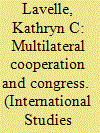

|
|
|
|
|
| Publication |
2011.
|
| Summary/Abstract |
International relations has demonstrated the contribution national legislatures make toward global cooperation. Yet what explains variation in securing funding for International Organizations (IOs) through the US Congress? I derive a theory of interaction from studies of interest groups in American politics and argue that the cause of funding delays and their resolution can be found where groups advance policy reform agendas through Congressional channels. Using process tracing of successive case studies, the article presents evidence from International Development Association (IDA) replenishments. It situates the rationality of members of Congress and other national and transnational actors within the context of a formal, domestic political institution whose budgetary process is deeply conflicted and subject to constant change. Thus, the theory offered here could be used by either rationalists or constructivists to support a material or ideational explanation for Congressional action.
|
|
|
|
|
|
|
|
|
|
|
|
|
|
|
|
| 9 |
ID:
103305


|
|
|
|
|
| Publication |
2011.
|
| Summary/Abstract |
This paper proposes a new conceptual tool to study norm dynamics in world politics. Termed norm subsidiarity, it concerns the process whereby local actors create rules with a view to preserve their autonomy from dominance, neglect, violation, or abuse by more powerful central actors. After a theoretical discussion of the definition, motivations, and effects of norm subsidiarity, the paper offers a case study of normative action against Cold War alliances (especially South East Asia Treaty Organization) by a group of Third World leaders led by India's Jawaharlal Nehru at the Bandung Asia-Africa Conference in 1955. It then offers examples from Latin America, the Middle East, and Africa to highlight the practice of norm subsidiarity. The paper contributes to the literature of international relations in three main ways. First, it reminds constructivist international relation scholars of the importance of understanding norm creation as a bottom-up process, marked by significant contestations and feedback. Second, it highlights the normative behaviors of Third World countries and their regional institutions, a neglected aspect of the literature on norm dynamics. Finally, the theory and practice of norm subsidiarity shed more light on the agency role of Third World countries in world politics.
|
|
|
|
|
|
|
|
|
|
|
|
|
|
|
|
| 10 |
ID:
103307


|
|
|
|
|
| Publication |
2011.
|
| Summary/Abstract |
In democratic elections, candidates and parties promise to deliver public goods to segments of the electorate to win their support at the polls. In new democracies, especially in rural agrarian societies, existing networks of clientelist politics can alter this logic, so that candidates instead promise private goods to patrons in return for those rural patrons delivering the votes of their clients. This suggests that in such regimes, the distribution of public goods spending by the government should vary inversely with the strength of clientelist networks. Specifically, we propose that the strength of patron-client ties varies according to whether peasants farm as smallholders, sharecroppers, fixed rent tenants, or landless laborers. Accordingly, the strength of rural patrons should vary across districts with the distribution of households among various land tenure categories. Our theory then suggests that where land tenure patterns render rural patrons weaker, elected governments should invest more resources in public goods to win the votes of peasants. Where land tenure patterns give patrons more control over peasant farmers, government spending on public goods should be lower because candidates and parties have to devote more resources to private benefits to the patrons. We test this proposition with district-level data from Nepal on the patterns of land tenure and on the provision of public goods.
|
|
|
|
|
|
|
|
|
|
|
|
|
|
|
|
| 11 |
ID:
103303


|
|
|
|
|
| Publication |
2011.
|
| Summary/Abstract |
As democratization has advanced in the developing world, developed countries such as the United States have implemented explicit strategies of democracy promotion by providing assistance to governments, political parties, and other non-governmental groups and organizations through a variety of channels. This analysis examines the relationship between democracy support by the US Agency for International Development and democratization in the developing world between 1988 and 2001. In a model that examines the simultaneous processes linking democratization and democracy aid, we argue that carefully targeted democracy assistance has greater impact on democratization than more generic economic aid packages. We test the relationship in a simultaneous equation model, supplemented by several time-series cross-sectional regressions. Our data reveal a positive relationship between specific democracy aid packages and progress toward democracy. We conclude by weighing the implications of these findings for democratization and democracy promotion policies.
|
|
|
|
|
|
|
|
|
|
|
|
|
|
|
|
| 12 |
ID:
103313
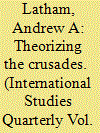

|
|
|
|
|
| Publication |
2011.
|
| Summary/Abstract |
The "crusades"-a series of wars launched by the Latin Church between the eleventh and fifteenth centuries-pose a significant unresolved puzzle for International Relations Theory. The purpose of this article is to develop a historically sensitive yet theoretically governed account of the crusades that solves this puzzle. Empirically, the article draws heavily on a body of historiographical work that emphasizes the constitutive role of "religious" ideas and discourses in the evolution of the crusades. Theoretically, it adopts a constructivist approach, specifying the intersubjective factors that enabled the crusades to emerge as a significant instrument of papal "statecraft" and as a key element of medieval geopolitical relations. The article concludes with some reflections on the theoretical relevance of this account of the crusades for both medieval geopolitics and contemporary international relations.
|
|
|
|
|
|
|
|
|
|
|
|
|
|
|
|
|
|
|
|
|